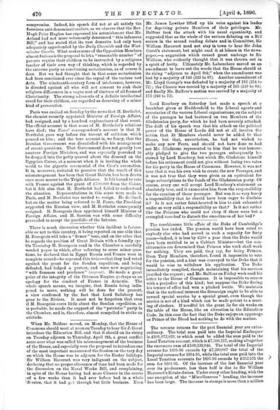When Mr. Balfour moved, on Monday, that the House of
Commons should meet at noon on Tuesday to bear Sir J. Gorst introduce the Education Bill, and that it should on its rising on Tuesday adjourn to Thursday, April 9th, a great conflict arose over what was called his mismanagement of the business of the House, and especially over the proposal to introduce one of the most important measures of the Session on the very day on which the House was to adjourn for the Easter holidays. Sir William Harcourt was very indignant on the subject, I declaring that no proper allowance of time had been made for the discussion on the Naval Works Bill, and complaining, in spite of the House having had more Closure in the course of a few weeks than it had ever before had in a whole 'Session, that it had get through but little business. Even
Mr. James Lowther lifted up his voice against his leader for depriving private Members of their privileges. Mr. Balfour took the attack with his usual equanimity, and suggested that as the whole of the serious debating on a Bil? occurs in the second reading debate and in Committee, Sir William Harcourt need not stay in town to hear Sir John Gorst's statement, but might read it at leisure in the news. paper,—a suggestion which caused great umbrage to Sir William, who evidently thought that it was thrown out in a spirit of levity. Ultimately Mr. Labouchere moved as an amendment to leave out the words that the House should at its rising "adjourn to April 9th," when the amendment was
by a majority of 146 (233 to 87). Another amendment of Mr. Lloyd George's was defeated by a majority of 182 (254 to 72) ; the Closure was carried by a majority of 165 (249 to 84). and finally Mr. Balfour's motion was carried by a majority of 173 (246 to 73).


































 Previous page
Previous page